Edition: 17 to 28 June 2024
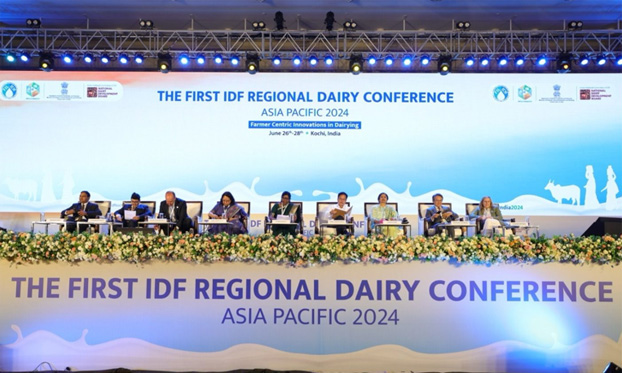 ©FAO/Rajesh Dubey | INDIA FAO emphasizes sustainable dairy practices at Asia Pacific conference
FAO highlighted the role of science, technology, and innovation at the first International Dairy Federation Regional Dairy Conference in Asia Pacific, held in Kochi from 26 to 28 June 2024. The conference was organized by the International Dairy Federation, in collaboration with the National Dairy Development Board and the Ministry of Animal Husbandry and Dairying, and focused on farmer-centric innovations in dairying. FAO Representative in India, Mr. Takayuki Hagiwara, underscored FAO's Strategic Framework 2022-2031, emphasizing its role in promoting sustainable practices and enhancing dairy value chains, while acknowledging the invaluable support from USAID. |
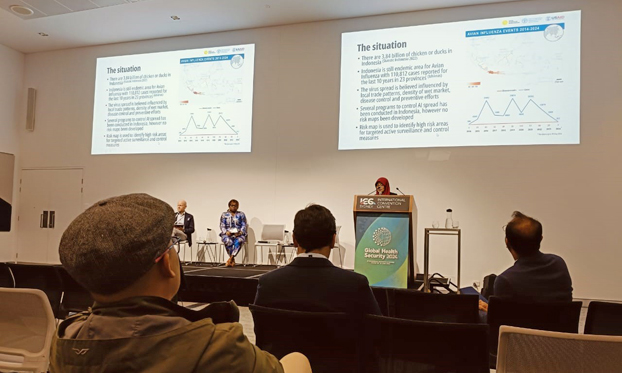 ©FAO/Gunawan Utomo | INDONESIA Global Health Security Conference 2024 in Sydney From 16 to 23 June 2024, through funding from USAID, representatives from FAO ECTAD Indonesia and the Directorate of General Livestock and Animal Health Service (DGLAHS) attended the Global Health Security Conference 2024 to present a poster and deliver an oral presentation in Sydney, Australia. The conference aimed to enhance global cooperation in health, utilize the latest health science developments, identify new solutions to overcome health security problems, and build consensus for real action in the field. The Indonesian delegation presented an oral presentation on "Mapping the risk of spread of avian influenza virus in Indonesia using multi-criteria decision modelling" and posters on "Improving the implementation of antimicrobial stewardship and infection prevention and control program in poultry farms for the provision of safe and healthy animal-based food for the community in Indonesia," and "Impact assessment of the Field Epidemiology Training Program for Veterinarians (FETPV) in Indonesia." |
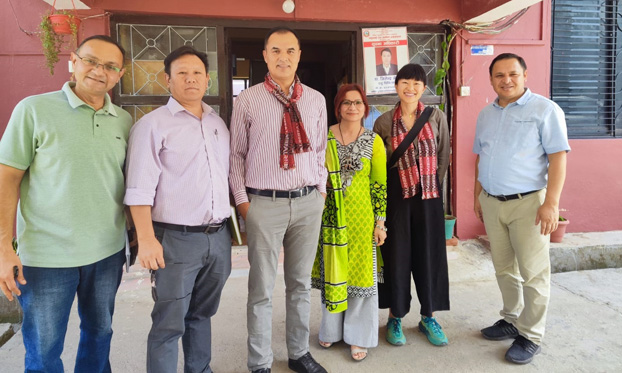 ©FAO/Surendra Karki | NEPAL USAID Country Mission visits field programs in Karnali, Nepal The USAID Country Mission Health team and FAO ECTAD Nepal team participated in a joint field mission in Surkhet and Salyan districts of Nepal to observe the implementation of field-level activities. The mission team participated in the sample collection, dispatch and epidemiological reporting training conducted at the Veterinary Laboratory, Surkhet and awareness training on prioritized zoonotic diseases and antimicrobial resistance for animal and public health professionals in Salyan district of Karnali province. |
Learn more about our work on partnerships here. | |
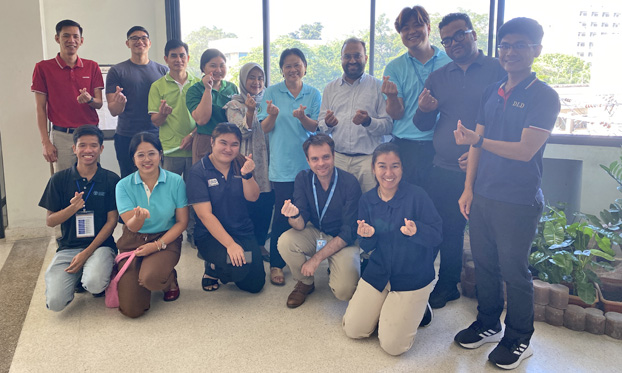 ©DLD, Thailand | ASIA AND THE PACIFIC Surveillance evaluation exercise conducted FAO conducted a surveillance evaluation exercise on animal health with trainees attending the Regional Field Epidemiology Training Program for Veterinarians (R-FETPV). The exercise was designed as a problem-based learning process, using an example scenario. This exercise aimed to provide a better understanding of the surveillance evaluation process and how to develop recommendations based on the evaluation results. |
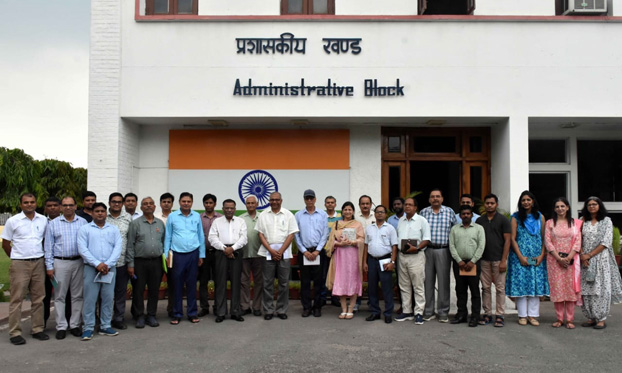 ©FAO/RK Singh | INDIA FAO organizes sensitization workshop for development of Standard Veterinary Treatment Guidelines On 23 June 2024, FAO, in collaboration with ICAR-Indian Veterinary Research Institute (ICAR-IVRI), Izatnagar, organized a sensitization workshop for the development of the Standard Veterinary Treatment Guidelines (SVTG) for India. This USAID-funded initiative by FAO, in collaboration with the Department of Animal Husbandry and Dairying, aims to create a harmonized approach to veterinary prescriptions in the country. The workshop was attended by 32 scientists who were briefed on the objectives, process, and methodologies for preparing the SVTG document. Dr Raj Kumar Singh, Zoonosis and Epidemiology specialist at FAO, delivered a detailed presentation on the development process and shared critical insights to aid the process. The session concluded with an engaging discussion, emphasizing the importance of timely completion and implementation of the SVTG to ensure consistent and effective veterinary practices across India.
|
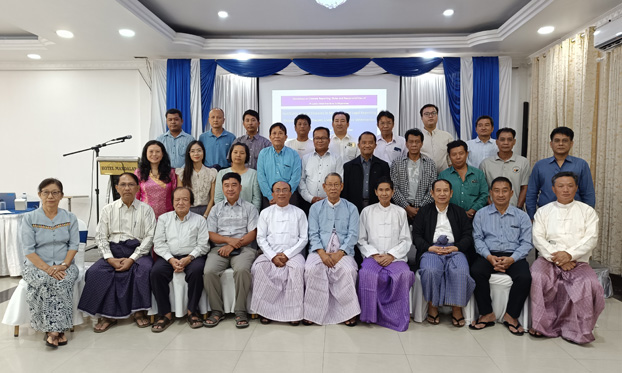 ©FAO/Win Thein | MYANMAR Disease reporting: roles and responsibilities of private veterinarians FAO and Myanmar Veterinary Association (MVA) jointly conducted a one-day workshop titled “Disease reporting: Roles and responsibilities of private veterinarians in Myanmar” on 18 June 2024 under the USAID-funded GHS program. Dr Khin Zaw, President of MVA gave opening remarks. The objectives of the workshop were to provide updated information on some important and emerging diseases, to share the roles and responsibilities of private veterinarians and to encourage disease reporting practices of private veterinarians. A total of 27 private veterinarians participated in the workshop. In addition, the participants received a FAO publication, Disease reporting: notes for private veterinarians in Myanmar.
|
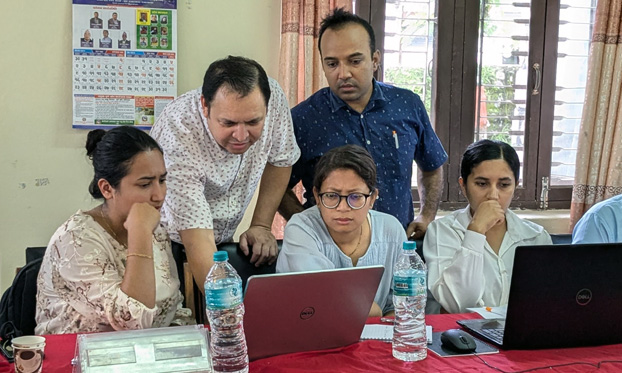 ©FAO/Surendra karki | NEPAL Animal health/livestock data visualization training using QGIS FAO, through USAID funded GHS project, conducted a two–day hands-on training on Animal Health/Livestock Data Visualization through QGIS to veterinarians working in Gandaki Province. The training was conducted during 29-30 June in Pokhara with the objective of equipping veterinarians with hands-on skills in animal health and livestock-related data visualization of point, qualitative and quantitative data. Twenty-two veterinarians were trained.
|
Learn more about our work on capacity development here.
| |
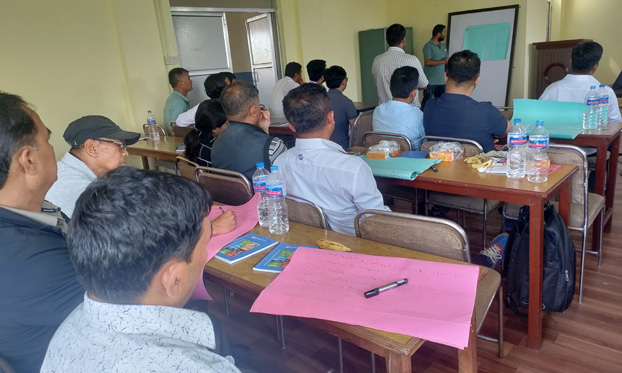 ©FAO/SURENDRA KARKI | NEPAL Cold chain assessment in five provinces conducted FAO, through the USAID-funded GHSP project supported a series of one-day provincial workshops on cold chain assessments in Sudur Paschim, Bagamati, Koshi, Lumbini and Madhesh provinces during the month of June. The objectives of these workshops were to assess the veterinary cold chain facilities in those provinces, identify gaps and prepare a roadmap for cold chain improvement in the veterinary sector. Officials from DLS, National Vaccine Production Laboratory, Provincial authorities, district chiefs and representatives of local levels participated in the workshop and provided their inputs. The assessment workshops were conducted in collaboration with the Department of Livestock Services. |
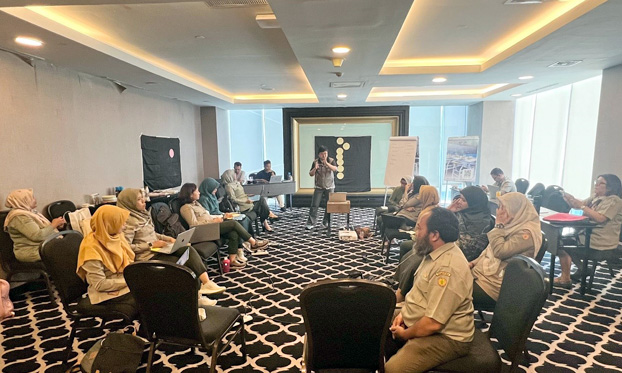 ©FAO/Wahid Husein | INDONESIA Simulation trial of the FMD-LSD detection and response training module On June 20-21, 2024, with support from the Australian Government, FAO ECTAD Indonesia and the Directorate General of Livestock and Animal Health Services held a two-day meeting in Jakarta to test the FMD-LSD detection and response training modules. This meeting followed the previous development of module training for field officers in early June. The meeting aimed to gather feedback for improving the modules based on a test run and familiarize facilitators with the flow of the Training-of-Trainers (ToT) simulation. Approximately five modules were tested, and feedback was collected. Following this, the team will conduct ToT and subnational training for the selected pilot district. |
Learn more about our work on epidemiology here.
| |
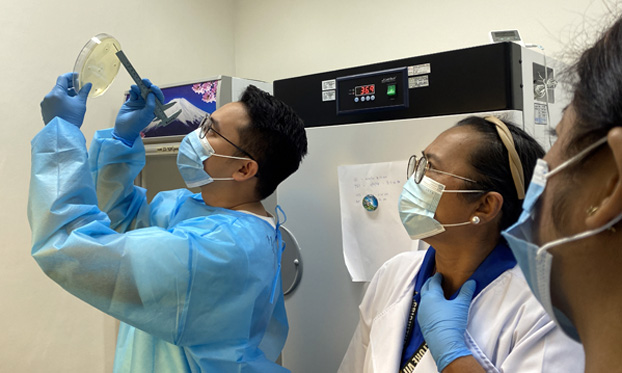 ©FAO/Elyza Anne Mayor | THE PHILIPPINES Training on bacterial isolation, identification, and antimicrobial susceptibility testing
A refresher training and parallel testing on bacterial isolation, identification, and antimicrobial susceptibility testing (AST) was held for the Regional Animal Disease Diagnostic Laboratory (RADDL) Region 7 in Mandaue City, Cebu on 24 to 28 2024. This is an ongoing initiative by the Bureau of Animal Industry-Animal Disease Diagnosis and Reference Laboratory (BAI-ADDRL) and FAO to standardize bacteriological procedures across RADDLs in the Philippines which is crucial for future nationwide antimicrobial resistance (AMR) surveillance in diseased terrestrial animals. RADDL Region 7 is the 13th laboratory visited among the 16 RADDLs. The activity was successfully conducted with support from the USAID GHS Project and the Fleming Fund Programme of UK Aid. |
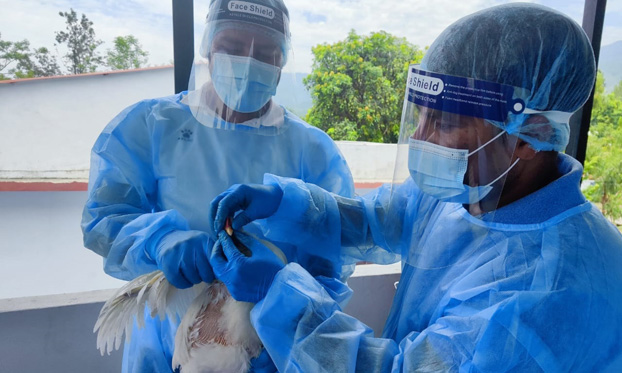 ©FAO/Surendra karki | NEPAL Sample collection, dispatch and epidemiological reporting trainings for animal health professionals FAO, through the USAID-funded GHSP project and the Pandemic Fund project, conducted a two–day training on “Sample collection, dispatch and epidemiological reporting” in Dailekh and Ramechhap districts respectively. The objective of this training was to equip animal health professionals working at local levels of Dailekh district of Karnali province with hands-on skills of appropriate sample collection, packaging and dispatch of samples for prompt disease diagnosis. The trainings were conducted during 10-11 June in Surkhet for Dailekh district and 27-28 June in Ramechhap where a total of 36 participants from veterinary hospitals and all the local levels were trained. The training was organized in collaboration with the Department of Livestock Services, Central Veterinary Laboratory and District veterinary laboratory. |
Learn more about our work on capacity development of laboratory here.
| |
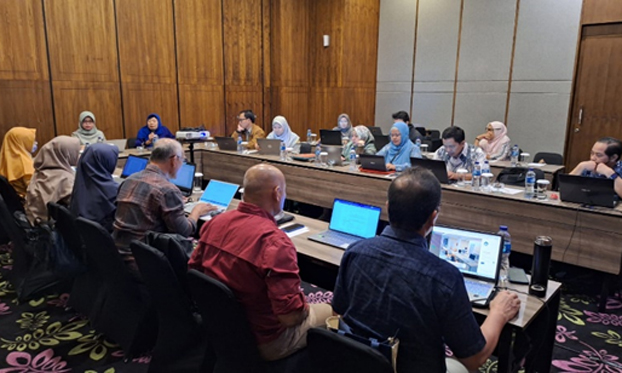 ©FAO/Ratmoko Saputro | INDONESIA Developing teaching materials for zoonoses awareness program for primary school On 19-21 June 2024, FAO ECTAD Indonesia, in collaboration with the Director of Veterinary Public Health (DVPH), organized a meeting to develop teaching materials for raising awareness of zoonotic diseases among teachers in primary schools in West Java, with funding from USAID. This meeting involved BBGP West Java Province and resulted in the drafting of five modules. These modules covered an introduction to zoonoses, priority zoonotic diseases (rabies, Highly Pathogenic Avian Influenza, anthrax, leptospirosis, and brucellosis), as well as a strategy for implementing zoonosis awareness through curriculum and integrated teaching modules. The meeting also discussed preparations for an upcoming training session for teachers in West Bandung and Sukabumi districts this July, especially focusing on pre and post-test assessments. . |
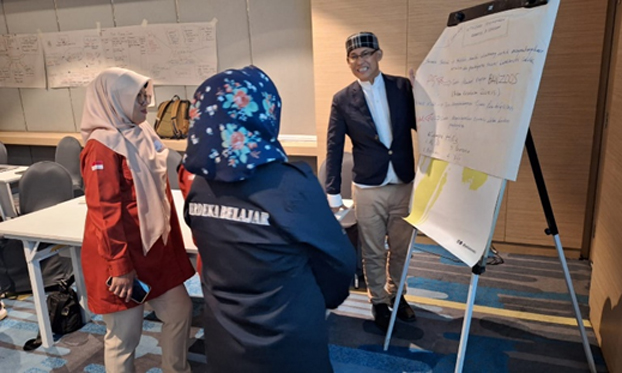 ©FAO/Ratmoko Saputro | INDONESIA Training on the Integration of Zoonoses Awareness to Merdeka Curriculum for Teachers in the West Bandung District
From 24-28 June 2024, with support from USAID, FAO ECTAD Indonesia and the Director of Veterinary Public Health (DVPH) trained teachers in the West Bandung district to be able to integrate zoonoses awareness to Merdeka Curriculum at the primary and secondary schools. This training involved twenty primary and secondary schools in West Bandung and forty school teachers. The participants received training on five modules related to the introduction of zoonoses and the priority zoonotic diseases, including rabies, highly pathogenic avian influenza (HPAI), anthrax, leptospirosis, and brucellosis. Following this, the zoonoses awareness program will be implemented in the schools starting in August 2024 with assistance from DVPH, BBGP West Java, and FAO ECTAD Indonesia. |
Learn more about our work on risk reduction along the value chain here.
| |
.jpg?sfvrsn=7eaca672_1) ©FAO/Surendra Karki | NEPAL Orientation Training on web-based National Animal Health Information System (NAHIS) FAO, through the USAID-funded GHSP project and the Pandemic Fund Project conducted ten sessions of one-day “Orientation training on the National Animal Health Information System (NAHIS) for epidemiological reporting” for animal health officials working at local levels and district hospitals of all nine districts of Sudur Pashchim Province (through GHSP) as well as all twelve districts of Lumbini Province (through Pandemic Fund) during the month of June. The objectives of these trainings were to train the field-level animal health officials to use the web-based NAHIS software for epidemiological reporting. The trainings were conducted in collaboration with the Department of Livestock Services.
|
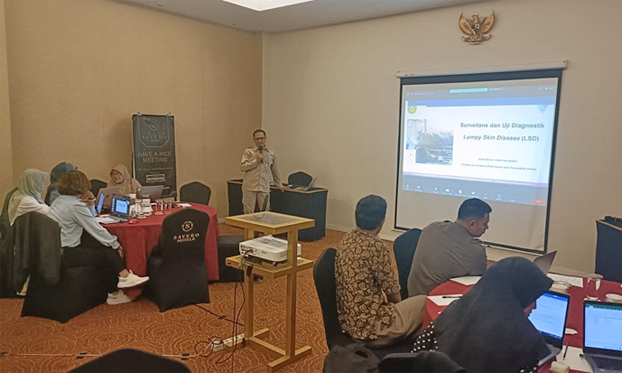 ©FAO/Riana Arief | INDONESIA Developing LSDV surveillance technical guideline From 11 to 13 June 2024, FAO and the Director of Animal Health (DAH) of the Ministry of Agriculture held a meeting in Bogor to create technical guidelines for surveillance of lumpy skin disease virus (LSDV) with support from the Australian Government. The meeting included a representative from the Disease Investigation Center (DICs), along with DAH, who presented a situation update, surveillance report, and laboratory diagnostics for LSDV. International experts from FAO headquarters and the International Atomic Energy Agency shared information on global LSD surveillance, country experience, and current LSDV diagnosis and testing. They stressed the importance of continuous virus monitoring and rigorous checks of LSD vaccine batches, along with vaccine quality analysis using molecular (sequencing) methods. The meeting resulted in the development of a draft of the technical guidelines for LSD surveillance, encompassing case definition, surveillance strategies for various areas, and surveillance methods.
|
| Learn more about our work on surveillance here. | |
-and-antimicrobial-resistance-(amr).jpg?sfvrsn=f79cbda4_1) ©FAO/Surendra Karki | NEPAL Orientation training on Prioritized Zoonotic Diseases (PZDs) and Antimicrobial Resistance (AMR) FAO, through the USAID-funded GHSP project, conducted an “Orientation training on prioritized zoonotic diseases (PZDs) and antimicrobial resistance (AMR)”in Salyan district of Karnali Province on June 12. The objective of this training was to orient field-level animal health and public health professionals on PZDs and AMR. The training was held in Veterinary Hospital, Salyan, where 20 animal health and public health professionals participated. The training programme was conducted in collaboration with the Department of Livestock Services and Veterinary Hospital and Livestock Service Center, Salyan.
|
-and-asean-one-health-joint-plan-of-action-(asean-oh-jpa).jpg?sfvrsn=90024755_1) ©FAO/Yin Myo Aye | ASIA AND THE PACIFIC AND INDONESIA Participation in launching of ASEAN One Health Network (AOHN) and ASEAN One Health Joint Plan of Action (ASEAN OH JPA) The AOHN and ASEAN OH JPA were officially launched on 19 June 2024 following a series of consultative meetings with Member States and key partners. FAO Indonesia contributed to the event in person and FAO RAP participated virtually. AOHN will enhance cross-sectoral communication, coordination, cooperation and collaboration between Member States in One Health implementation. The ASEAN OH JPA aims to improve regional and national capacity and capabilities with tangible targets towards optimized and sustainable balanced health of humans, animals (domestic and wildlife), plants and the environment in the region.
|
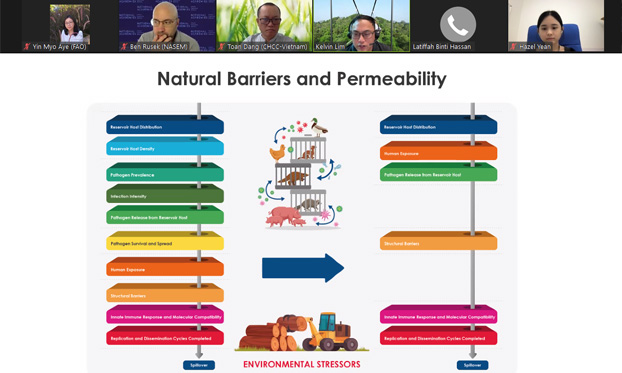 ©FAO/YIN MYO AYE | ASIA AND THE PACIFIC The contribution in the development of the guideline for countering zoonotic spillover The International Network for Governmental Science Advice (INGSA-Asia chapter) formally released the Guidelines for Countering Zoonotic Spillover of High Consequence Pathogens in the Southeast Asia Region on 28 June 2024. The guidebook focuses on preventing and mitigating the consequences of zoonotic spillover originating in live animal supply chains that involve the overlap between wildlife and other animal species, humans and the environment. FAO RAP also contributed in the development of this guideline using experiences in the region, particularly for the module on how to enhance zoonotic disease management by addressing knowledge gaps and implementation barriers, read more here.
|
| Learn more about our work on One Health here. | |
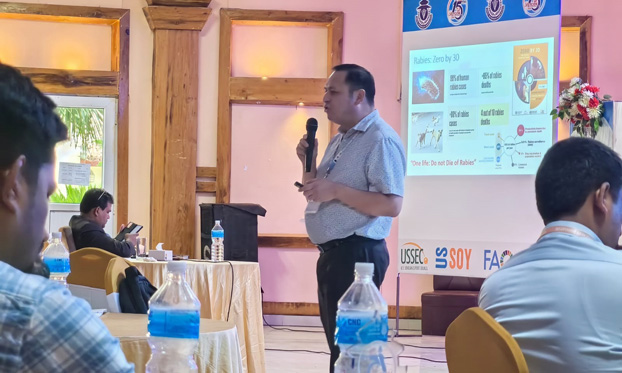 ©FAO/SUrendra Karki | NEPAL Awareness on Zoonoses, AMR and One Health during National Veterinary Conference
FAO, through the USAID-funded GHSP project supported a technical session on “Awareness on Zoonoses, AMR and One Health” during the 15th National Veterinary Conference conducted on 7-8 June in Sauraha, Chitwan. The objective of this session was to raise awareness of veterinarians on zoonoses, AMR and One Health and the role veterinarians can play in these areas. FAO ECTAD Nepal’s Team Leader gave a talk highlighting global and national scenarios of zoonoses, AMR and One Health and FAO technical assistance to the Government of Nepal in animal health strengthening of Nepal. The technical session was chaired by Dr. Umesh Dahal, Director General, Department of Livestock Services. More than 300 public and private veterinarians attended the conference. |
Learn more about our work on AMR here.
| |
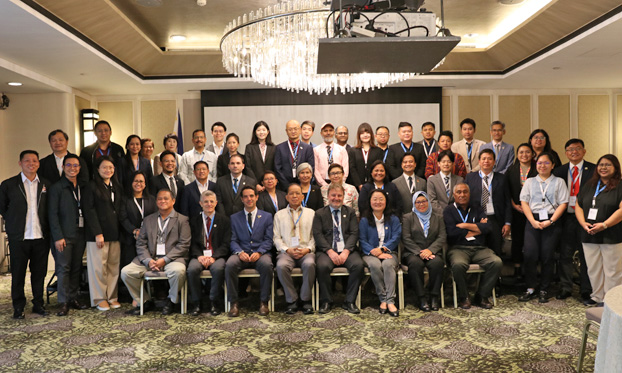 ©BAI/Jezikiel Guardiano | ASIA AND THE PACIFIC Ninth meeting of the standing group of experts on ASF for Asia and the Pacific
FAO and the World Organisation for Animal Health co-organized the ninth meeting of the standing group of experts on African swine fever for Asia and the Pacific. The meeting was held from 25 to 27 June in Makati, Philippines in collaboration with the Bureau of Animal Industry of the Philippine Department of Agriculture and focused on risk communication and community engagement (RCCE). The meeting, which was organized under the Global Framework for the Progressive Control of Transboundary Animal Diseases (GF-TADs) initiative, was attended by representatives from Member Nations, WOAH delegates and Chief Veterinary Officers, observers and subject matter experts from the World Health Organization Regional Office for Western Pacific. FAO ECTAD team members from RAP and the Philippines provided technical support and facilitated sessions particularly on RCCE and behaviour change communication. The participants agreed to forward several recommendations including strengthening RCCE capacities in countries. The event was made possible through the financial support from Republic of Korea Ministry of Agriculture, Food and Rural Affairs (ROK MAFRA) and the People’s Republic of China’s Ministry of Agriculture and Rural Affairs (PRC-MARA). |
Learn more about our work on ASF here.
| |
